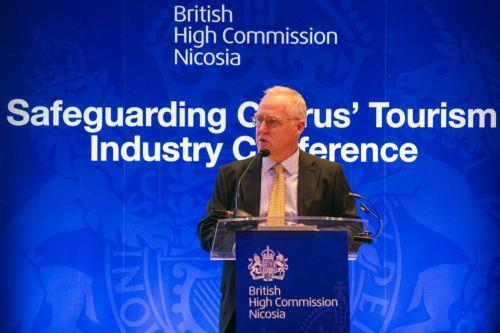Cyprus and the United Kingdom have unveiled what they described as Europe’s first online platform to train tourism-sector staff in recognising and reporting potential terrorist threats, as well as managing crises, during an event in Limassol on Wednesday.
The initiative, announced at the ‘Safeguarding Cyprus’s Tourism Industry’ conference jointly organised with the Deputy Ministry of Tourism, reflects the two countries’ close cooperation on security and law enforcement, the British High Commission said.
Speaking at the event, British High Commissioner Michael Tatham noted that “34 per cent of tourists to the island were British citizens” in 2024, adding that the two countries therefore share a strong interest in protecting Cyprus’ tourism industry, which attracts visitors for its “sun, blue skies and Mediterranean climate”.
He described the platform as part of “a deep and strategic bilateral partnership, which is based on shared values and interests, including in the security sector.”
Tourism remains a key pillar of the Cypriot economy, contributing €3.2 billion annually, and Tatham stressed that security is integral to maintaining a safe-destination reputation, calling it “a priceless asset, hard-earned and important to protect.”
Moreover, drawing on international experience, he said that even a single security-related incident can cause “untold human tragedy and a blow to confidence in a destination”, with consequences for jobs, investment and long-term reputation.
He went on to describe Cyprus as an important partner for the UK in a region facing “complex security challenges”, saying the two states “can constitute a security bridge between Europe and the Middle East.”
Against this background, he called the expansion of cooperation into tourism security “a natural development” and confirmed the launch of the new training platform. It is designed for hotels, airports, restaurants, bars and other venues with high concentrations of visitors, allowing staff to improve awareness, invest in training and integrate best practices.
Importantly, he said the programme is not limited to theory but offers “operational training that can save lives, ensuring that frontline personnel have the confidence and ability to act decisively in a crisis.”
Developing a culture of vigilance, he added, would strengthen Cyprus’ reputation as a safe destination and support growing tourism ties.
For his part, Deputy Ministry of Tourism director general Costas Constantinou said the security of the tourism sector is crucial during periods of crisis and uncertainty.
He referred to evolving risks ranging from geopolitical tensions and terrorism to health emergencies and cyberattacks.
Constantinou said the ministry’s aim is for “every visitor to feel safe, every professional to be prepared and every community to be protected”, emphasising that safeguarding the sector is a shared responsibility.
He urged stakeholders to raise awareness and improve readiness, saying: “Let us raise awareness, let us train to respond effectively, let us empower to act with confidence.”
Public-private partnerships, he added, are essential to building a resilient tourism ecosystem capable of preventing, managing and recovering from incidents.
The platform, developed with UK support, offers role-specific training, realistic scenarios and interactive content in both Greek and English to ensure accessibility across the sector.
Cyprus police representative Maria Charalambous expressed the force’s support for the programme’s goals, while officials later presented details of the platform’s operation before opening a discussion with tourism-industry participants.






Click here to change your cookie preferences